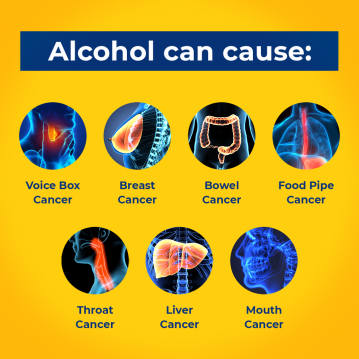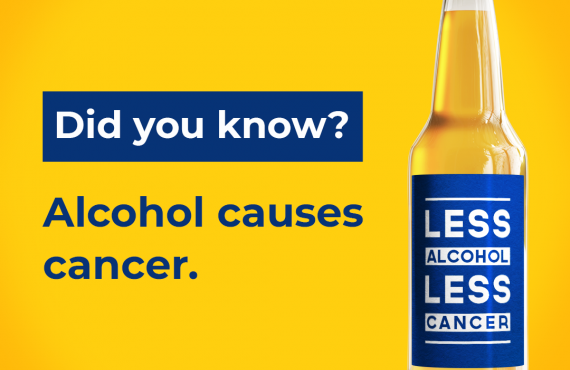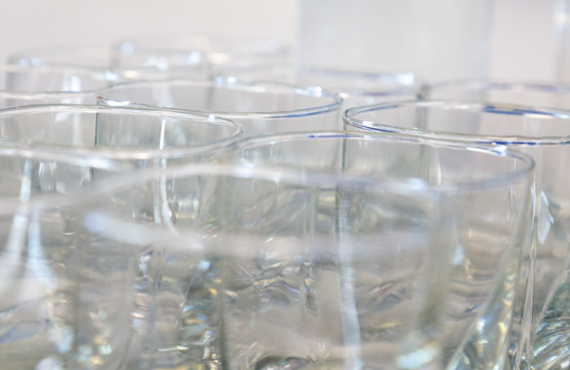Alcohol causes cancer. Not drinking or drinking less alcohol reduces your risk of many cancers.
Avoiding Alcohol
To help reduce the cancers that are caused by alcohol we want to see it less available, less convenient, and less affordable in our communities.
As alcohol is a preventable cause of cancer in Aotearoa, this is an important focus for the Cancer Society.
We all have a part to play to encourage the government to protect whānau from alcohol-related cancer through:
- raising awareness that alcohol causes cancer and
- advocating for greater alcohol policies
There is no such thing as ‘safe’ drinking
There is no safe level of drinking alcohol in relation to cancer. Drinking any regular alcohol can increase your chance of developing some cancers. To protect against alcohol-related cancer, The World Cancer Research Fund, recommends, ‘it is best, not to drink alcohol’.
However, no one should feel blamed for developing cancer. While alcohol can increase the likelihood of cancer, individual risk depends on may things such as your age, genetics and the environment in which you live.
Frequently asked questions about alcohol and cancer
Alcohol is the common name used for ethanol (also known as ethyl alcohol), which is a chemical that is produced by the fermentation of sugars and starches by yeast. Fermentation is the process used to produce beer, wine, spirits, and fermented products such as kombucha and cider
Alcohol and its breakdown products (acetaldehyde) can cause cell change such as in the mouth and throat. Alcohol can also cause hormonal changes (such as oestrogen), that cause cells to divide and develop faster, increasing the chance of cancer.
There is strong evidence that alcohol increases the likelihood of at least seven types of cancer. Alcohol can cause cancer of the mouth, pharynx (throat), larynx (voice box), oesophagus (food pipe), liver, bowel, and breast (in women). Bowel cancer and breast cancer (in women) are two of the most common cancers in Aotearoa. The high energy content (kilojoules or calories) of alcohol can also cause weight gain and weight-related-cancers.

The Cancer Society NZ follows advice of respected agencies such as the World Cancer Research Fund (WCRF) and International Agency for Research on Cancer (IARC).
These agencies look at thousands of studies, involving millions of people with cancer and their use of alcohol. This helps estimate the number of people who might be get cancer from alcohol. All these agencies agree that alcohol is a cause of many different types of cancer. However, cancer risk depends on lots of things, such as age and genetics, and it is mostly not possible to determine the specific cause of each individual cancer.
No one should feel blamed for developing cancer. In most cases, we do not know the specific cause of an individual’s cancer. Many factors, such as alcohol, can increase the likelihood of cancer, but individual risk depends on lots of things including those you cannot change like your age, genetics, and the environment in which you live.
Not everyone who drinks alcohol will develop cancer. However, drinking alcohol regularly can increase the likelihood of cancer, like tobacco, too much UV sun radiation, being overweight and a lack of physical activity. Less or no alcohol, can reduce your likelihood of getting cancer.
You probably know that smoking or spending too long in the sun can cause cancer, but you might not know that alcohol can also increase the risk of at least seven types of cancer.
There is no amount of alcohol that is ‘safe’. Drinking even small amounts of alcohol regularly can cause cancer. For example, breast cancer in women increases by around 7-10 percent per standard drink per day. For more information see What’s a Standard Drink?.
The more alcohol, the higher the chance of developing cancers. To protect against alcohol-related cancer risk, it’s best not to drink alcohol.
For more information or help, see Alcohol.org.nz or Alcohol Drug Helpline.
It is never too late to stop drinking alcohol. While stopping alcohol may not provide an immediate decline in cancer risks, it does occur over time. The less alcohol the lower the chance of an alcohol-related cancer.
Alcohol causes cancer and yet it is cheap, advertised everywhere and easy to get. Stricter laws limiting alcohol advertising, sport sponsorship and the number of places selling alcohol will help reduce cancer in our communities. Warning labels on alcohol (like tobacco) could also help reduce cancer but currently there is no requirement for these.
The Cancer Society is working with other agencies to get support for greater alcohol regulation to protect communities from alcohol harm
Reducing alcohol where we live, work and play
Communities where there is less alcohol available and less marketing allowed, would be a good way to showcase whānau friendly spaces and positive role modelling. Reducing alcohol in our communities is an important area of work for the Cancer Society to help reduce cancers caused by alcohol.
Currently, alcohol is cheap, widely marketed, and easy to get. Poorer suburbs often have even more alcohol advertising and outlets selling alcohol than others.
- Māori youth are exposed five times and Pacific three more to alcohol marketing everyday, compared to European youth.
Young people who have greater exposure to alcohol marketing are more likely to start drinking at an earlier age and engage in binge and hazardous drinking. The easy access to cheap alcohol affects alcohol-related cancer risk and the higher rates experienced by whānau.
We support stronger laws to reduce the availability, affordability and marketing of alcohol and its normalisation in our communities.
What can you do?
If we all work together, we can create an environment where alcohol is less readily available in our communities to help lower the chance of cancer.
Everyone has a part to play in limiting alcohol where we live, work and play. Talk to your whānau, workplace, school or community about ways to take action to reduce alcohol in your organisation or community:


